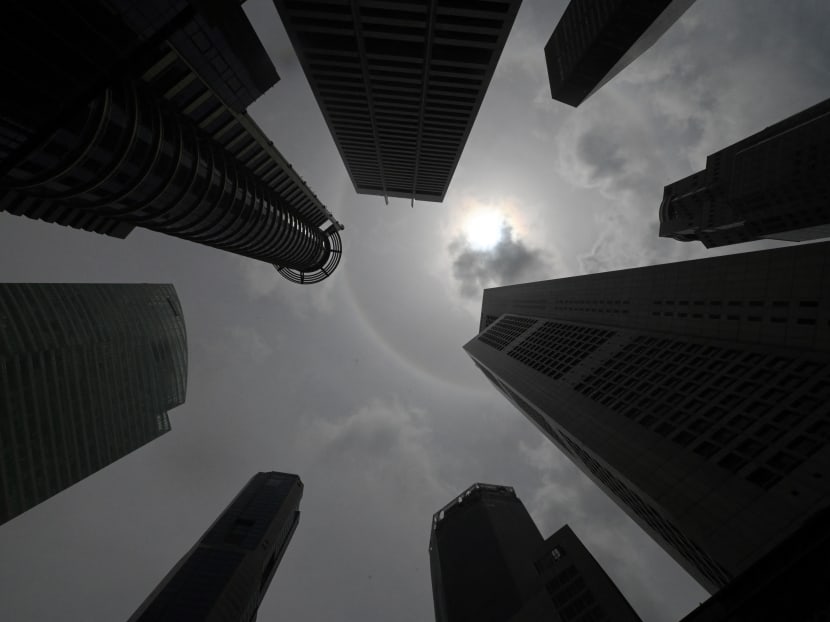Explainer: What will likely cause a recession by 2024 that PM Lee cautioned about?
SINGAPORE — Prime Minister Lee Hsien Loong spoke recently about the likelihood of a global recession happening within the next two years.

Skyscrapers in Singapore's financial business district silhouetted by the afternoon sun.
- Prime Minister Lee Hsien Loong said on May 1 that there may be a recession in 2023 or 2024
- Analysts said some factors that could lead to a recession include the Russia-Ukraine war and China's strict zero-Covid-19 regime
- It could happen faster than Mr Lee’s prediction if there is a rapid deterioration in global demand conditions, coupled with an escalation in the Russia-Ukraine crisis, one economist said
- Job losses and cuts in wages are to be expected should a recession hit Singapore
SINGAPORE — Prime Minister Lee Hsien Loong spoke recently about the likelihood of a global recession happening within the next two years.
Factors such as Russia's invasion of Ukraine have clouded the outlook for Singapore's post-pandemic recovery, with the increase in energy prices setting Singapore back by about S$8 billion a year, he said during a May Day Rally on Sunday (May 1).
Inflation will remain high and major central banks are tightening their monetary policies. "Global growth will be weaker and there may be a recession within the next two years," he added.
Singapore's tight links with the global economy and its small size make it more susceptible to these "global headwinds", he cautioned.
When the oil price was around US$50 (S$69) a barrel, the annual imports of crude oil and natural gas cost Singapore roughly S$30 billion a year.
TODAY spoke to analysts to find out more about whether a recession could happen and what are the key risk factors that could lead to it.
WHAT COULD CAUSE A RECESSION?
Analysts said that one of the factors to watch for is a sharp decline in global demand.
Ms Selena Ling, head of treasury and research at OCBC bank, said that other key drivers that could cause a recession include the Russia-Ukraine war, China's strict zero-Covid-19 regime, elevated energy prices, global supply chain bottlenecks and tensions between the United States and China.
"(There are) so many things that can go wrong. Basically, they hurt business and consumer confidence, exacerbate imported inflation, prompt central banks to front-load monetary policy tightening, which may cause market indigestion and a pullback in demand conditions as interest rates rise sharply and so forth," Ms Ling added.
Adding on to her point, Mr Bernard Aw, an economist at Coface, a global trade credit insurance group, said that a sharp decline for consumer and corporate demand in Singapore's key export markets, which include China, Japan, the US and major Southeast Asia countries, will be a key factor behind a recession.
Mr Aw, who analyses and monitors Asian economies, said that deep contraction in global demand could be driven by several factors.
These include:
- A steep decline in China’s economic activity as a result of its measures to clamp down on Covid-19 and the resulting disruptions in domestic supply chains
- A European recession caused by energy supply shocks and strong inflationary pressures
- Weakening US consumption and investments due to high inflation, and sharp rises in borrowing costs
The analysts who spoke to TODAY said that a recession scenario happening in Singapore would involve "an overly aggressive" US Federal Reserve (Fed).
The US Fed monitors risks to the financial system and works to help ensure the system supports a healthy economy for US households, communities and businesses, among other tasks.
Maybank Kim Eng’s economist Chua Hak Bin said: "An overly aggressive Fed bent on killing inflation may lead to a US recession sometime in 2023 to 2024. Singapore will likely follow suit and slide into a recession in such an event.
“A recession scenario probably involves the Fed tightening and raising policy interest rates beyond 3.5 per cent."
WILL A RECESSION HAPPEN IN SINGAPORE IN 2023?
The analysts said that a recession happening in the next year is unlikely.
Dr Chua said: "Our Singapore recession model, which is based on the US’ three-month to 10-year yield spread, suggests that the probability of a recession over the next 12 months is only about 6 per cent."
The US yield spread or term spread is defined as the difference between three-month and 10-year US Treasury bond prices and it is seen as a reliable indicator of future economic performance, due to the interdependent nature of bond prices, bond yields and interest rates.
He added that China’s zero-Covid-19 measures and lockdowns or the Russia-Ukraine war are not enough “as a shock to produce a recession in Singapore".
In the event of a global recession, Singapore’s stock market will not be immune and “may fall by 30 per cent to 60 per cent from its peaks depending on the depth and duration of the recession", Dr Chua said.
When asked how Mr Lee could have come to the two-year prediction, Ms Ling from OCBC said: "I’m not sure how he arrived at (it), but the more major central banks front-load their policy tightening, the risk of a policy mistake is definitely growing. It would really boil down to how policy tightening and geopolitics materialise and develop from here."
Headline inflation is expected to overshoot to 4.5 per cent to 5.5 per cent this year, while core inflation is also tipped at 2.5 per cent to 3.5 per cent this year, which Ms Ling believes "will likely stay above its historical average".
Mr Aw from Coface said some factors that could shorten the timeline of two years set out by Mr Lee include "a rapid deterioration in the global demand conditions, coupled with an escalation in the Russia-Ukraine crisis, with the possibility of a broadening war, and a surge in energy and food prices".
RECESSION, STAGFLATION: WHAT’S THE DIFFERENCE?
Ms Ling warned that there is a growing risk of stagflation as growth momentum is slowing and inflation remains elevated and persistent.
Stagflation, which the world has not seen since the 1970s' oil shock, happens when economic stagnation and inflation combines and it is a situation where an economy faces the twin challenges of slow economic growth and joblessness in the midst of rising inflation.
When asked what it would mean for stagflation to overlap with a recession, Mr Aw said: "A stagflation can also be a recession combined with high inflation. Economic output can be stalling or falling (thus leading to a recession) in a stagflation situation."
He added: "We should expect the possibility of stagflation in Singapore if the global economy falls into such a situation. The (country’s) use of the exchange rate as a monetary policy instrument has been effective, however, in keeping inflation stable for the past four decades."
WHAT ARE THE CONSEQUENCES OF A RECESSION?
Analysts told TODAY that one indicator that could signal that a recession is coming up is the global energy bill.
Mr Aw said: "In the past, whenever the world energy bill is above around 7 per cent to 8 per cent of gross domestic product (GDP) for a year, a recession tends to follow in the next one to two years."
Other warning signs include sharp asset price corrections, accompanied by rapid loss of business and consumer confidence, Ms Ling said. Sharp asset price corrections could dampen consumer spending, for instance.
The impact of a recession on Singapore is the possibility of job losses or greater job uncertainties.
Mr Aw said: “This recession, if it materialises, will likely be accompanied by higher inflation, which erodes the purchasing power of consumers and imposes economic hardship on the population."
As for Ms Ling, she said: "A recession would hurt the average Singaporean by potentially causing job losses, cutbacks in wages, tightening of belts, delays in capital expenditure (money spent on productive assets such as machinery or computers) and weigh on confidence levels."











